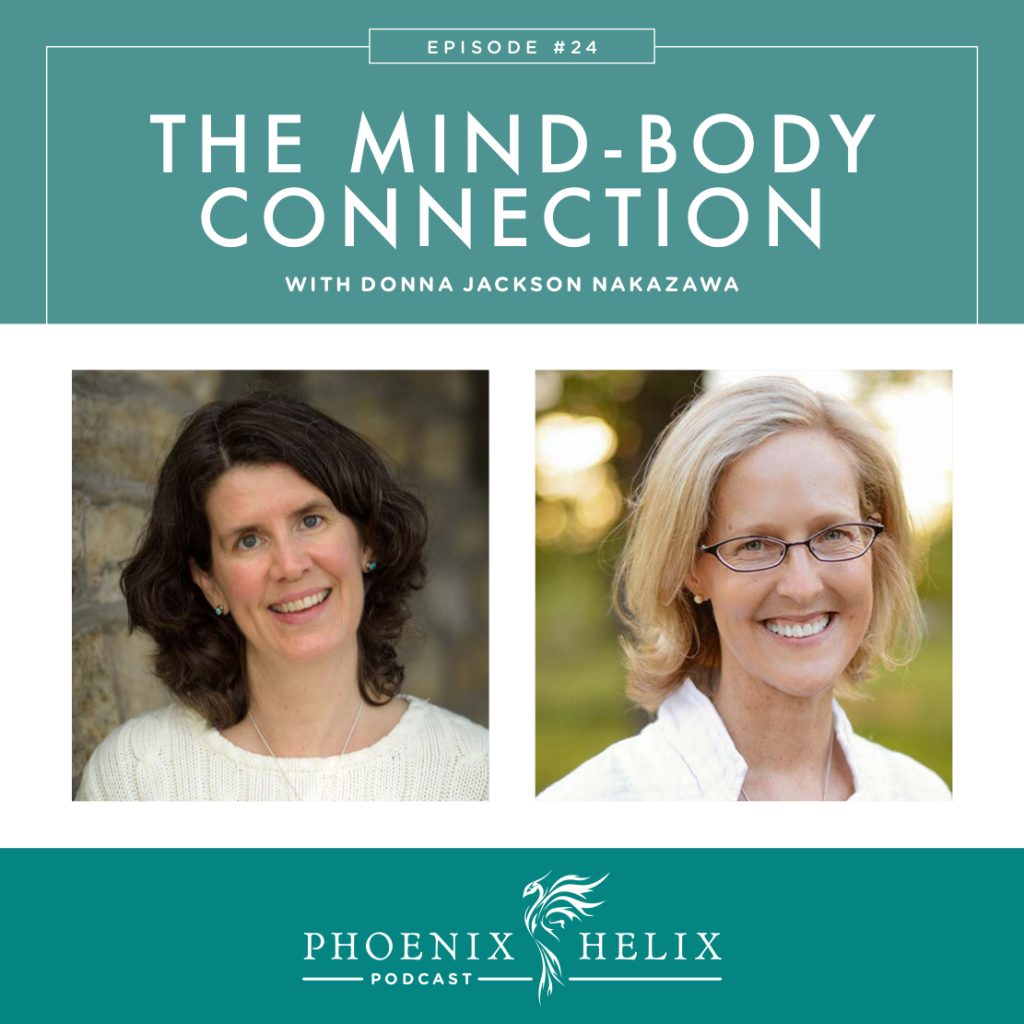
Can Our Minds Help Heal (or Harm) Our Bodies?
Once upon a time, this idea was considered new age and science-fiction, but as we gain understanding into the brain and body, we see how intimately one affects the other. Not only is our brain performing billions of actions to keep us alive every second (and this isn’t an exaggeration). Our thoughts and emotions actually influence this biochemical and neurological cascade, either increasing or decreasing inflammation, and even changing our immune system in a way that makes us more (or less) vulnerable to autoimmune disease. It’s a fascinating field of research called Psychoneuroimmunology.
Today, I interview Donna Jackson Nakazawa, a woman living with autoimmune disease herself, who is also the author of two books about the mind-body connection. In The Last Best Cure, she chronicles her year-long self-experiment into mind-body practices and their effects on her own autoimmune symptoms. In Childhood Disrupted, she researches how childhood trauma can change both our developing brain and immune systems, which can set us up for autoimmune disease later in life. She also shares tools to help reverse this process.
Listen to the Show
- Subscribe to my podcast through your favorite podcast app: iTunes, Stitcher, Google, TuneIn, Spotify, Amazon, etc.
- You can also listen to the episode right here through the player below, and if you subscribe to my newsletter you’ll get notified of future episodes.
Podcast: Play in new window | Download
Show Notes
- Intro (0:00)
- Meet Donna (0:51)
- An award-winning science journalist who has written three books about autoimmune disease: The Autoimmune Epidemic, The Last Best Cure, and Childhood Disrupted.
- She has numerous autoimmune diagnoses herself, including Guillain-Barre Syndrome, Thyroiditis. and Pancytopenia. At her worst, she was paralyzed and bedridden. Years of conventional medicine and therapies helped her regain her mobility, but she was left with disabling exhaustion as well as chronic pain. She turned to mind-body therapy to see if she could reclaim joy in her life.
- Her Year-Long Mind-Body Self-Experiment (8:02)
- Her new doctor introduced her to the idea that stress, both currently and in the past, could affect her autoimmunity in the present-day. Together, they created a mind-body treatment plan. Donna agreed to keep all other variables the same (no changes in diet, supplements or medication), and added meditation, yoga and acupuncture to her life.
- For the first 6 months, she practiced meditation and mindfulness only. Next she added yoga, and lastly, she added acupuncture.
- All 3 modalities improved her health dramatically. In her book, The Last Best Cure, she shares the details, including changes in her blood work, pain levels, fatigue, strength, eczema, family relationships, and daily happiness.
- What is Psychoneuroimmunology – PNI? (10:11)
- The field of science that explores how our mind, brain and immune system interact. When we are having stressful thoughts, our brain sends an inflammatory cocktail throughout our bodies. Chronic stress (or negative thoughts) = chronic inflammation. Over time, this changes how our cells, organs, and immune system function, even changing the expression of our genes through epigenetics.
- Resource: research articles on PNI.
- The Impact of Childhood Trauma on Adult Autoimmune Disease (12:40)
- Adverse Childhood Experiences (ACEs) can change the ways genes express themselves also. Healthy bodies have a stress response that turns on when needed and off when no longer needed. Children who have experienced trauma or high stress at a young age, lose this ability. Their stress response stays switched on for life, unless they take steps (through mind-body techniques) to turn it off again.
- While negative experiences can result in negative epigenetic expression of our genes, positive ones can reverse those changes. The second half of Donna’s book, Childhood Disrupted, details all the ways we can turn the stress response off again.
- Donna herself had an impactful ACE experience – her father’s death when she was a child. Part of her healing during the mind-body year was addressing the impact this had on her body and her health.
- Quote from the book: “The link between being female, facing adversity in childhood, and later developing a serious autoimmune disease is so consequential that it resembles the link between smoking and lung cancer, drunk driving and car accidents, and unprotected sex and pregnancy.”
- ACE experiences have a stronger effect now than in the past, because in modern life our bodies are under stress from multiple directions, including chemicals in our food and our environments. The combination of all factors makes us more vulnerable to autoimmune disease.
- Resource: ACE Survey to check your ACE Score.
- Resource: research articles into the impact of ACE experiences on health.
- One Reason Why More Women Than Men Have Autoimmune Disease (24:10)
- Estrogen allows women to do everything a man does with smaller bodies and smaller organs, and in addition, give birth to children. Estrogen gives us a more robust immune response as well. Under chronic stress, our estrogen regulation becomes faulty, driving a higher immune response that can turn into autoimmunity.
- The Mind-Body Connection Can Help Anyone with Autoimmune Disease (35:47)
- Not everyone with autoimmune disease had a traumatic childhood. And not everyone with a traumatic childhood develops autoimmune disease. It is one factor among many.
- Autoimmune disease is a chronic stressor itself, and the mind-body connection can be a powerful tool in anyone’s healing journey.
- Mind-body techniques decrease inflammation body-wide, help the body come back into a state of homeostasis, and take our brain out of its stress-reactive state. Basically, we replace the inflammatory response with a relaxation response, instead.
- Mindfulness Techniques (42:51)
- Mindfulness is the best method for repairing the brain. Donna highly recommends MBSR, an 8-week course on mindfulness-based-stress reduction. It’s offered in many communities – simply Google the name of your town and MBSR to see if there’s a course near you. If not, here’s a free online course: Palouse Mindfulness.
- When she tried to quiet her mind, she noticed that her thoughts were very negative and self-critical. A key for her (and for anyone) is to replace those internal diatribes with self-loving thoughts instead.
- Some of her personal favorite mindfulness techniques are simple: (1) bringing awareness to her breath, (2) placing her hand over her heart, (3) replacing negative and critical thoughts with positive and loving ones, (4) visualization, (5) saying the mantra “you are forgiven.”
- Mindfulness Book: Full Catastrophe Living by Jon Kabat-Zinn
- Guided Mindfulness Meditations by Tara Brach ~ Sharon Salzberg ~ Jack Kornfield and Pema Chodron.
- Update 2022: Eileen (your podcast host) wrote a book with over 90 mind-body techniques for people with autoimmune disease: Healing Mindset.
- Outro (1:01:46)
- You can keep up with Donna’s work through her website or Facebook. Her books are: The Autoimmune Epidemic, The Last Best Cure, and Childhood Disrupted.
- Eileen (your podcast host) is the author of multiple books, written to help people thrive with autoimmune disease. Learn more on the Books Page.
- If you like this podcast, follow or subscribe through your favorite podcast app. You can also subscribe to Eileen’s biweekly newsletter.
- Check out the entire archive of podcast episodes.
You May Also Be Interested In
Spreading the Word
If you like the podcast, please leave a positive review in iTunes. It would mean the world to me, and also helps others find the podcast. Here are some quick instructions using your iPhone:
- If you are already subscribed to my podcast: (1) Click the purple podcast icon. (2) At the bottom of the screen, click Library. (3) At the top of the screen, click Shows. (4) Click the Phoenix Helix podcast image. (5) Scroll down the page, and you’ll see Ratings and Reviews. Scroll down a little bit more and click on Write a Review. This will bring up the review screen. Tap 5 stars (if you love the podcast), and then click in the title box, and it will bring up the keyboard. Enter a title and short review. (6) Click Send in the upper right corner. (7) Thank you! Positive reviews give the podcast a higher search ranking in iTunes, helping people find it and letting them know it’s a quality podcast and worth their time to listen.
- If you haven’t subscribed to my podcast: (1) Click the purple podcast icon. (2) In the lower right corner, click the magnifying class. (3) Type Phoenix Helix in the search box. (4) Click the podcast cover in the Show list. (5) If you’d like to subscribe, click the + sign at the top of the screen. (6) To write a review, scroll down the page, and you’ll see Ratings and Reviews. Scroll down a little bit more and click on Write a Review. This will bring up the review screen. Tap 5 stars (if you love the podcast), and then click in the title box, and it will bring up the keyboard. Enter a title and short review. (7) Click Send in the upper right corner. (8) Thank you! Positive reviews give the podcast a higher search ranking in iTunes, helping people find it and letting them know it’s a quality podcast and worth their time to listen.

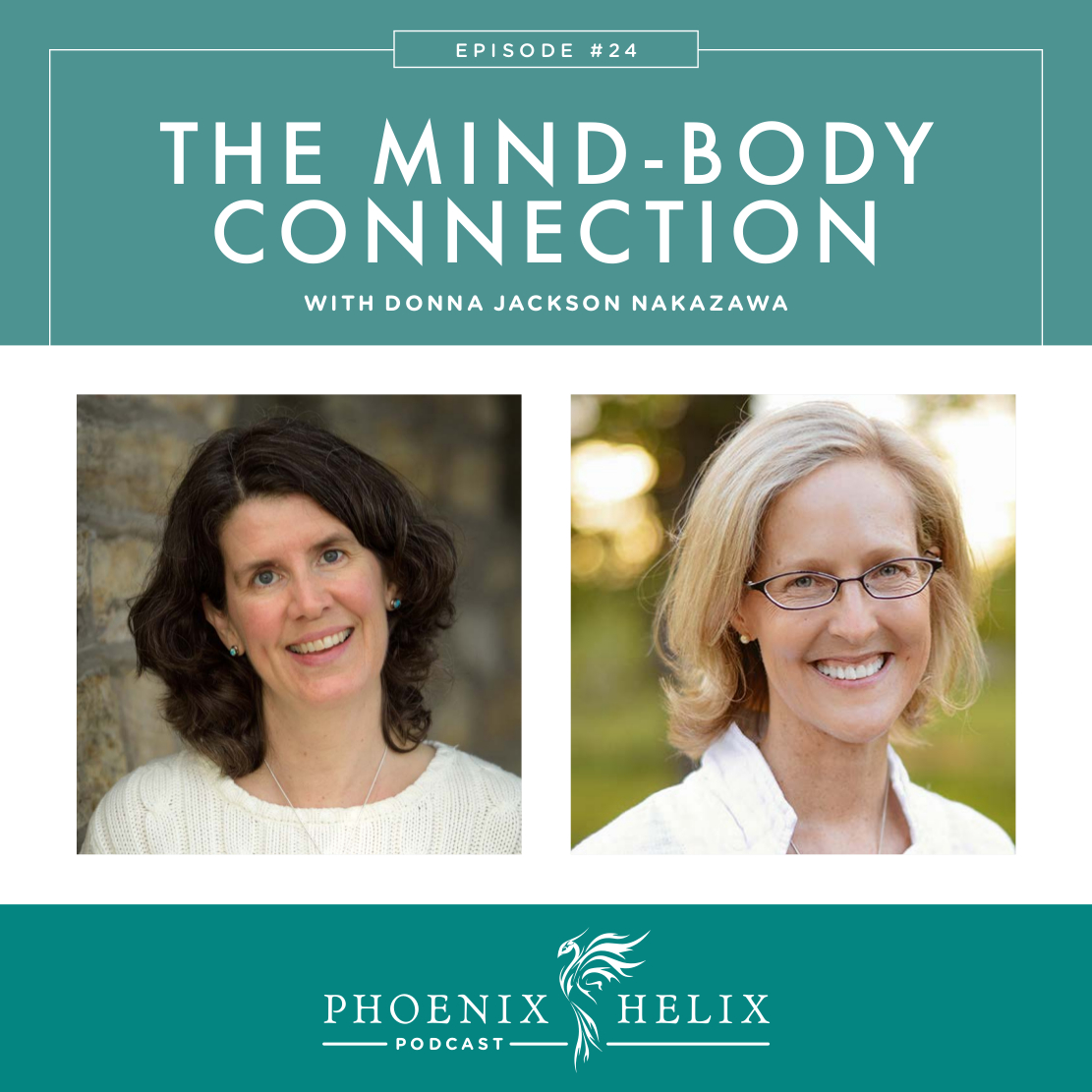
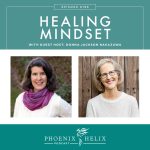
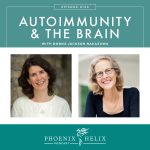
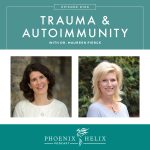
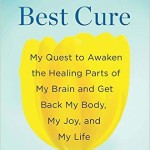
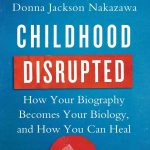
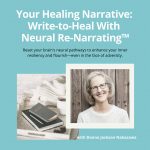

This is amazing and hit the nail on the head. Reading Gabor Maté’s “When the Body Says No” was also life-changing. I’m just starting this journey of healing of the mind.
Thanks for sharing that title, Maria. I’m adding that to my reading list, too.
This podcast resonated so deeply with me! I believe whole-heartedly that unless our stress is reduced (not managed, because really, we’re all “managing” it on some level, and, not well) and we develop healthy coping skills, food and fitness changes will not have the impact they otherwise could. When I first started AIP, the food caused me crazy stress! Also, I started my 8-week MBSR class last week, so I was so happy to hear Donna recommend it. I originally thought I’d take it to help my clients with stress, but I quickly discovered that I was in dire need of the practice myself. With an ACE score of 6, I see that stress has laid the foundation for illness in my life including cancer twice and auto-immune illness, but I am so thankful that I can change that – that’s a gift and a blessing! Be well 🙂 Thanks for all you do!!
Hi Jeanne. I’m so glad you found this podcast at this time in your life. I’m taking an MBSR class too! Mine starts in two weeks – I’m excited and nervous at the same time – but mostly hopeful about its positive potential for my life.
Great, thanks for posting this. I will be tuning in and looking up her books.
My pleasure, Laurie.